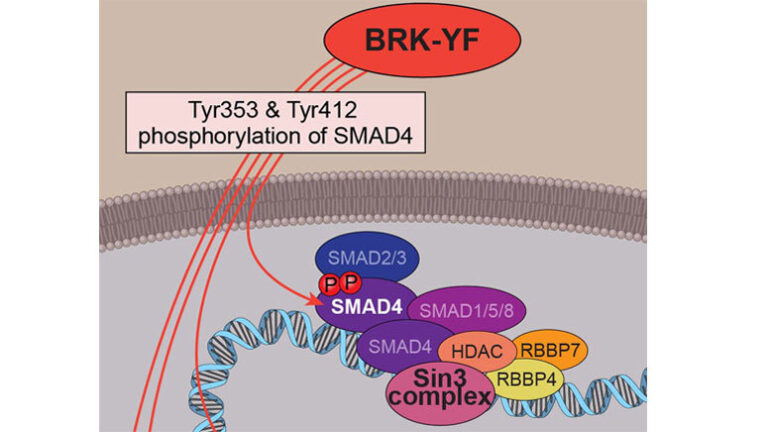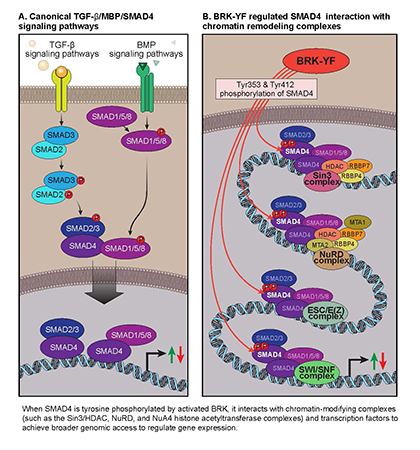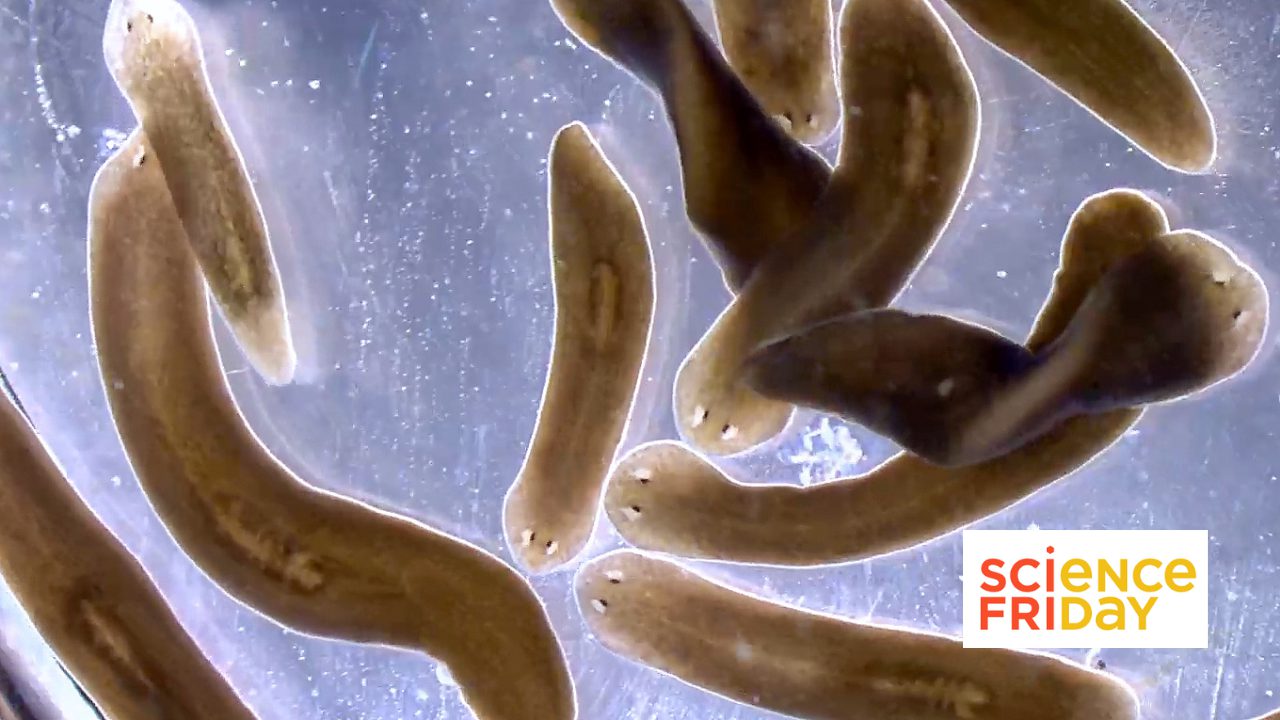In The News

07 January 2026
Investigator Kamena Kostova, named ‘Cell Scientist to Watch’
From the Journal of Cell Science, Investigator Kamena Kostova named a 'Cell Scientist to Watch'
Read Article

KANSAS CITY, MO - Researchers from the Stowers Institute for Medical Research have uncovered new details about several proteins implicated in tumor growth and metastasis, opening a potential avenue for the development of treatments for diseases such as breast cancer.
The research focuses on the tumor-suppressing function of SMAD4, a transcription factor protein normally involved in the regulation of cell growth processes. Its function is often turned off in breast cancer, which allows tumors to grow and metastasize. In this report, published online October 23, 2019, in Science Advances, the researchers found that BRK, a non-receptor protein tyrosine kinase, binds to and leads to SMAD4 breakdown. The study was done using human cell lines, including a panel of breast cancer cell lines.
“The BRK kinase is present in more than 85 percent of breast cancer tumors,” said Sayem Miah, PhD, a postdoctoral research associate in the laboratory of Michael Washburn, PhD, at the Stowers Institute. “Our research suggests that treatments targeting BRK may help keep SMAD4 function intact, therefore reducing or stopping tumor growth,” Miah says.
Miah began this research while he was a PhD student at the University of Saskatchewan, Saskatoon, Canada, working with Kiven Erique Lukong, PhD, whose lab studies BRK. “We’ve known for a while that BRK functions like an oncogene – a gene that has the potential to cause cancer when mutated or abnormally expressed – in breast cancer,” Miah explains. “Ultimately, we want to know whether BRK alone can drive breast cancer progression, and if so, by what mechanism.”

Image: Courtesy of Washburn Lab
After he completed his PhD work at the University of Saskatchewan, Miah moved to Stowers where he joined the Washburn Lab, which focuses on using proteomic approaches to understand biological processes.
“It’s a good example of the type of research that’s possible at Stowers,” Washburn says. “We have the resources, freedom, and flexibility to allow scientists like Dr. Miah to follow up on intriguing results and finish research projects that produce results like this.” Washburn also notes that Miah was able to use a powerful mass spectrometer at Stowers to complete his research. “There’s value in this kind of serendipity in science. Dr Miah brings a totally different set of skills and insights to our group, and our lab offers new access to technology and expertise.”
Miah believes that these findings are an important step in understanding how cancer works and would like to find other molecules that work with BRK to degrade SMAD4. “If we can further increase our understanding of this protein network, these insights may reveal new targets for metastatic cancer intervention,” he said.
Other contributors to the research include Charles A.S. Banks, PhD, Anita Saraf, PhD, Gaye Hattem, Cassandra G. Kempf, Mihaela Sardiu, PhD, and Laurence Florens, PhD, from the Stowers Institute, and Yetunde Ogunbolude, PhD, Edward T. Bagu, PhD, Josh MacAusland-Berg, and Scott Napper, PhD, from the University of Saskatchewan.
This work was supported by the Stowers Institute for Medical Research and the National Institute of General Medical Sciences of the National Institutes of Health under Award Number RO1GM112639 to MPW. The content is solely the responsibility of the authors and does not necessarily represent the official views of the National Institutes of Health.
In addition, the work was supported by the 2017 College of Medicine Research Award (CoMRAD) offered by Office of the Vice Dean Research (OVDR) at the University of Saskatchewan, Saskatoon, Canada to KEL, and by the National Science and Engineering Research Council of Canada to SN.
Lay Summary of Findings
Scientists from the Stowers Institute for Medical Research have discovered new details about several proteins implicated in cancer. The research focuses on the SMAD4, a transcription factor that normally suppresses tumor growth. In breast cancer, SMAD4 function is often impaired, which sets the stage for tumors to grow and spread to additional sites in the body.
Using proteomic, biochemical, and imaging techniques, researchers from the laboratory of Michael Washburn, PhD, and collaborators found that a protein called BRK binds to and leads to the breakdown of SMAD4. The study, which examined the proteins in human cell lines including breast cancer cell types, was published online October 23, 2019, in Science Advances. The research suggests that treatments targeting BRK, which is present in more than 85 percent of breast cancer tumors, may help retain SMAD4 function, therefore reducing or stopping tumor growth.
About the Stowers Institute for Medical Research
The Stowers Institute for Medical Research is a non-profit, basic biomedical research organization dedicated to improving human health by studying the fundamental processes of life. Jim Stowers, founder of American Century Investments, and his wife, Virginia, opened the Institute in 2000. Currently, the Institute is home to about 500 researchers and support personnel, over 20 independent research programs, and more than a dozen technology development and core facilities. Learn more about the Institute at www.stowers.org and about its graduate program at www.stowers.org/gradschool.
In The News

07 January 2026
From the Journal of Cell Science, Investigator Kamena Kostova named a 'Cell Scientist to Watch'
Read Article
#Stowers25: Celebrating 25 Years
06 January 2026
Alejandro Sánchez Alvarado, Ph.D., reflects on a year of discovery, gratitude, and the community that helps support our mission.
Read Article
In The News

01 January 2026
From Science Friday, President and CSO Alejandro Sánchez Alvarado talks about the science of regeneration and the biology lessons we can carry into the new year.
Read Article
